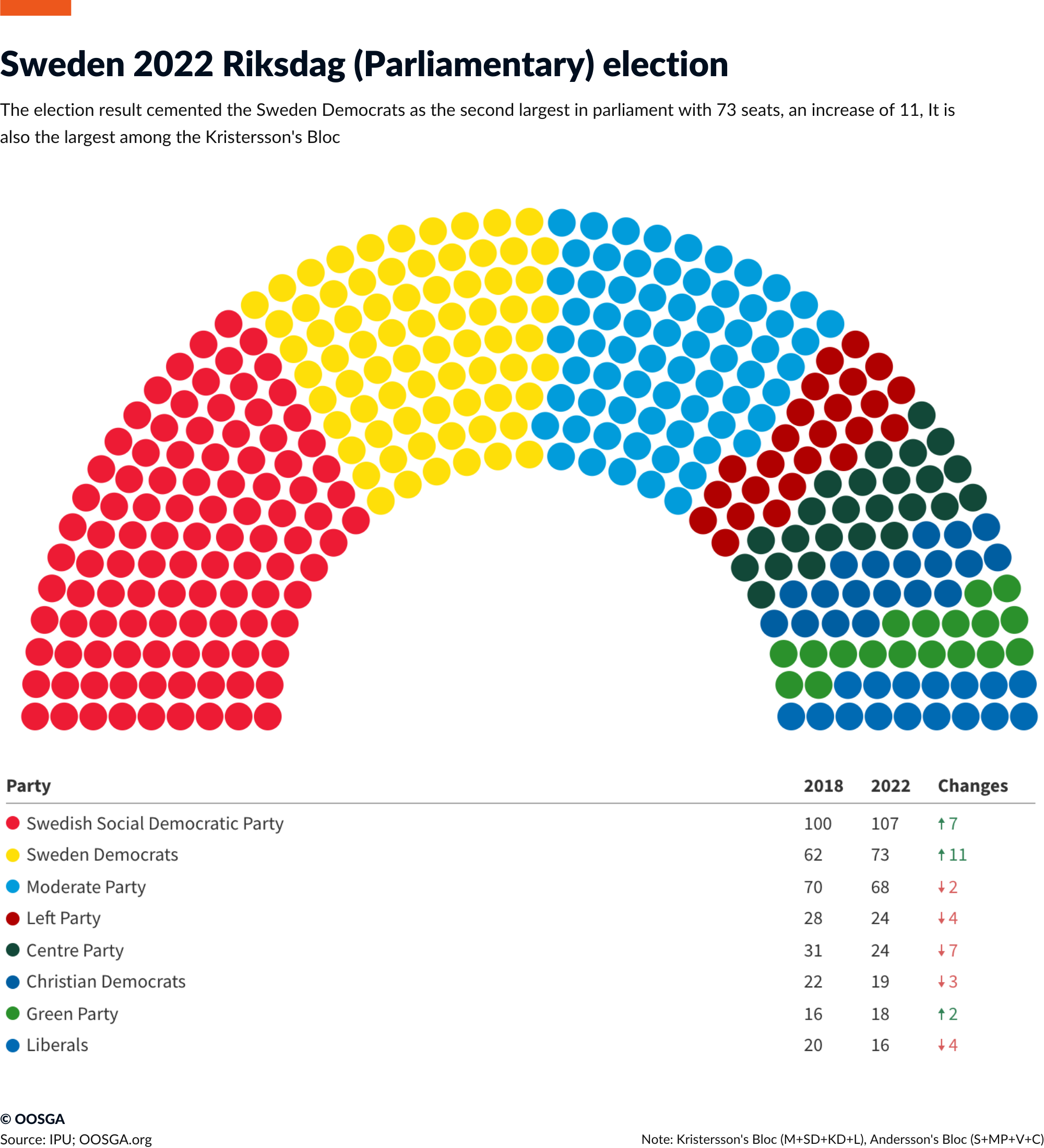Connect With Authors
*Your message will be sent straight to the team/individual responsible for the article.
Sweden has been a constitutional monarchy since 1809 and introduced a new written constitution in the 1970s. The country has one of the world’s most advanced social-welfare systems, based mainly on legislation from the early post-war period. Sweden joined the EU in 1995 but did not adopt the single currency after rejecting it in a 2003 referendum.
The Riksdag, a single-chamber parliament, consists of 349 seats, of which 310 are allocated to the 29 constituencies and 39 are adjustment seats distributed at the national level to achieve a nationally proportional result. A party must gain 4% of the national vote or 12% of a constituency vote to enter parliament, and Sweden’s political system is characterized by a multiparty system, with coalitions and minority governments being the norm.
The new government’s focus will be on defense spending and energy subsidies to help alleviate the energy crisis. While there is a general consensus on Sweden’s successful economic and social model, the major political differences revolve around labor-market policies, such as unemployment benefits, marginal tax levels, the future of nuclear energy, and the extent of privatization of public services and state-owned companies. Sweden’s previously liberal immigration policies have been tightened since 2015 due to rising public sentiment. The Riksbank has abandoned its negative-interest-rate policy due to concerns about financial stability, and addressing high household debt remains a priority.
Sweden’s government will prioritize its presidency of the Council of the European Union from January 1st to June 30th 2023 over domestic issues. The government has identified four areas of policy to focus on during its tenure: the fight against serious crime, preparing for another recession, achieving climate goals, and leading Sweden into NATO. The government also plans to prioritize employment creation by reducing social-security contributions to incentivize job creation. Due to pressure from the SD, the government will tighten its policy stance on immigration, stating that high levels of immigration have caused Sweden’s largest economic and social problems.
Sweden’s plan for spending the EU recovery fund proceeds will focus on the green transition, with 44% of the total allocated to achieving a more environmentally friendly economy. This exceeds the minimum requirement of 37% under the regulations of the Recovery and Resilience Facility. The funds will be invested in research and development to decarbonize emissions-intensive industrial sectors, develop electric-car charging infrastructure, and other projects aimed at reducing greenhouse gas emissions. Additionally, 20.5% of the allocation will be directed toward the digital transition, including improving access to high-speed internet connections in sparsely populated areas and investing in higher vocational education and universities to improve digital skills. The remaining funds will be used to increase the supply of rental dwellings to ease the housing shortage.
28.45 Billion
- %
0.7 %
32.7 %
Sweden’s right-wing bloc has won the country’s general election, securing a narrow lead over the centre-left coalition, signaling the end of the Social Democrats’ eight-year rule. Vote counts show the Moderates, Sweden Democrats, Christian Democrats and Liberals winning 176 seats in the 349-seat parliament, against 173 for the centre-left. The anti-immigration Sweden Democrats are set to overtake the Moderates as Sweden’s second-largest party and the largest in the opposition.
Sweden’s election campaigning saw parties battle to be the toughest on gang crime, with a steady rise in shootings that unnerved voters. Meanwhile, surging inflation and the energy crisis following the invasion of Ukraine have increasingly taken centre-stage. Whichever bloc wins, negotiations to form a government in a polarized and emotionally charged political landscape are likely to be long and difficult.

-
26
Sweden’s business environment is considered robust, with several key strengths that include a highly skilled workforce, an excellent network infrastructure, a stable regulatory environment, and solid macroeconomic fundamentals. Furthermore, Sweden’s readiness for technology and research and development is high, and it is one of the world’s most digitally advanced economies. The country is well-positioned to respond to technological and environmental trends.
The financing environment is currently supportive of business expansion, but it could become strained in the future, given banks’ high exposure to the real estate sector and the possibility of rising interest rates and a slowing global economy. While Sweden offers high-quality public services and social welfare, the business environment score is weighed down by a high personal tax burden, elevated private-sector indebtedness, and restricted competition in some product markets.
-
9
$
44.83 $
3770 $
0.4279 %